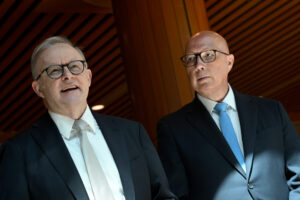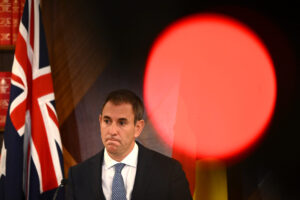The apparent Coalition aim of cutting taxes does not match its public declarations about reducing the deficit. But tensions within the Coalition make any move on taxes difficult.
Does Joe Hockey think removing the deficit levy will make the deficit go away? Announced in last year’s budget, the temporary 2 per cent increase in the top marginal tax rate was designed to collect additional revenue and help solve the government’s so-called “budget emergency”. But while budget forecasts suggest that the deficit is now permanent, Joe Hockey has adamantly said the levy should be temporary.
The problem for Coalition strategists is that there is a fundamental tension between the Coalition’s private priority of cutting taxes and their public priority of fixing the deficit. Having trained the Australian public to see budget deficits as evidence of the ALP’s poor economic management, Tony Abbott and Joe Hockey are struggling to convince the public that Coalition deficits are OK.
The problem is confounded by the determination of the Coalition to ignore the opportunity to collect more revenue. Since Joe Hockey called for a “national conversation” about tax he has been flooded with good advice about where he could efficiently and equitably collect more of it. Economists, business groups, unions and NGOs have pumped dozens of good ideas into the public debate, all of which would help reduce the deficit that Mr Hockey was once so concerned about.
CRUSHED BY TENSIONS
Closing tax loopholes would allow the government to collect a lot of revenue, cut the budget deficit and overcome the perception that they care more about big business than the outer suburban voters who put them in office. But politics is harder than policymaking, and Tony Abbott is not only being crushed by the lack of revenue on the budget, he is also being crushed by the political tensions within the Coalition.
The Liberal backbench have made clear that they won’t support a leader that sends them out to sell another round of harsh cuts to health or pensions.
But Peter Costello and his parliamentary lieutenants, urged on by former Business Council of Australia chair and Audit Commission head Tony Shepherd, are adamant that anything other than further tax cuts for the wealthy and spending cuts for the poor is proof of political gutlessness.
Costello and Abbott were once rivals for John Howard’s favour and the future prime ministership. While Abbott won on both counts, Costello obviously knows how to goad his former colleague. By defining support for tax cuts as a test of courage and moral strength, Costello knows Abbott would rise to prove his worth. The problem for Abbott is that in proving he is as hardline as Costello, he is also proving to the public that he cares more about cutting taxes for the rich than he does about solving “budget emergencies”.
It gets worse. While the Senate made it clear last year that it will not pass cuts to pensions or services that were not proposed before the 2013 election, it has also made clear it is willing to consider passing new forms of revenue.
CONVERSATION CUT SHORT
The crossbench, the Greens and the ALP have made supportive noises about reforming tax breaks on super. Indeed, the ALP and Greens have proposed specific reforms. Similarly, the ALP has proposed measures to crack down on multinational tax minimisation, a problem that Hockey himself has repeatedly said he wants to address.
But rather than respond positively to the clear signals being sent by the Senate about areas of potential agreement, the Prime Minister has cut short the “national conversation” about tax in order to calm down the conservative commentariat.
Tony Abbott needs help if he is to manage a rampaging Costello, an understandably nervous backbench, and a Senate that refuses to support inequitable policies for which the government can claim no mandate. Luckily for him, here is a path through the minefield.
Closing tax loopholes, collecting more revenue and investing in Australia’s young people is not just good for the budget, it is good for society and the economy as well. While the former BCA boss has become a chief spear carrier for the ideological legacy of Peter Costello, the new BCA boss Catherine Livingstone has been striking a much less partisan tone. If she is serious about the business community playing a more positive and less partisan role in Australian politics, she could begin by urging the government to retain the deficit levy and close the loopholes. While such an approach would enrage the jilted Costello, it would be proof that the business community is willing to invest for the long term, not just take in the short term.
Economist Richard Denniss is the executive director of The Australia Institute.
Originally published by the Australian Financial Review – here
Related documents
Between the Lines Newsletter
The biggest stories and the best analysis from the team at the Australia Institute, delivered to your inbox every fortnight.
You might also like
5 ways and 63 billion reasons to improve Australia’s tax system
With a federal election just around the corner, new analysis from The Australia Institute reveals 63 billion reasons why our next Parliament should improve the nation’s tax system.
Three simple, fair steps which would raise 70 billion dollars a year in extra tax
New Australia Institute research has identified three simple tax reforms which would raise an extra 70 billion dollars a year without hurting low or middle-income Australians.
Tax reform isn’t hard – slug multinationals and subsidise the things we want more of
Taxes are the price we pay for civilisation, but they are also a tool we can use to change the shape of our economy, not just its size.



